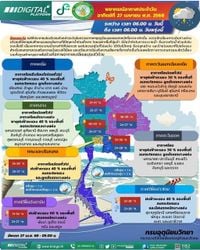Thailand's timber industry is facing significant challenges as accusations of dumping from neighboring countries like Vietnam and South Korea threaten its market stability. The Thai plywood industry is responding to these allegations with a robust defense, emphasizing the quality and potential of its products.
In recent developments, the Thai plywood industry has been scrutinized after Vietnam initiated an anti-dumping investigation into Thai Medium Density Fiberboard (MDF) and Particleboard on September 25, 2024. This was followed by South Korea launching a similar investigation on December 16, 2024. These actions have raised concerns among Thai exporters, prompting them to formally contest these allegations.
Ms. Jomkwan Yuwatepakorn, chairperson of the Thai Plywood Industry Group, stated, "The MDF and Particleboard produced in Thailand are made from locally sourced materials such as rubberwood and eucalyptus, which not only meet domestic demand but are also suitable for export, contributing positively to the national economy." In 2024, Thailand exported MDF and Particleboard worth approximately $853.28 million and $464.74 million, respectively, showcasing the industry's potential.
Vietnam has emerged as a crucial market for Thai MDF, with exports valued at $60.48 million in 2024. The accusations from Vietnam stem from a perception that Thailand's competitive pricing is undermining local industries. Meanwhile, South Korea's investigation appears to be influenced by environmental policy changes that have increased production costs for its local manufacturers.
Mr. Wanchai Chaiyirawiwat, an advisor to the Thai Plywood Industry Group, highlighted the significance of both Vietnam and South Korea as major markets for Thai MDF and Particleboard. He noted that these materials are widely used in furniture production and construction sectors within these countries.
In response to the ongoing investigations, the Thai industry is collaborating closely with the Department of Foreign Trade and other governmental agencies to advocate for the dismissal of these anti-dumping inquiries. The goal is to ensure that the investigations adhere to both domestic laws and international standards.
As Thailand navigates these challenges, it is also looking to enhance its timber market through collaborations aimed at improving product standards and meeting global market demands. The Thai Chamber of Commerce has emphasized the importance of adapting to changing trade dynamics, particularly in light of the economic slowdown in China and the aggressive trade policies under the Trump administration.
Mr. Sanan Angubolkul, Chairman of the Thai Chamber of Commerce, remarked on the broader economic landscape, stating, "2025 will be a pivotal year for Thailand as we face various internal and external factors influencing our economy. We must proceed cautiously amidst global uncertainties and geopolitical tensions, particularly from the U.S. under the current administration."
Despite the challenges, the Thai economy is projected to grow between 2.4% and 2.9% in 2025, driven by several positive factors. The export sector is expected to remain a vital engine for growth, provided that businesses can swiftly adapt their strategies to leverage existing Free Trade Agreements (FTAs) and explore new markets in countries like India, Vietnam, and Saudi Arabia.
Foreign Direct Investment (FDI) is another critical area of focus, particularly in strategic industries such as digital technology, logistics, electronics, and electric vehicles (EV). The Thai Chamber of Commerce is advocating for increased investment in the Eastern Economic Corridor (EEC) to bolster regional economic growth.
Tourism is also poised to play a significant role, with projections indicating that 39 to 40 million international tourists could visit Thailand in 2025. This influx will provide much-needed support to the local economy, which has been recovering from the impacts of the COVID-19 pandemic.
However, Mr. Angubolkul cautioned that while the Thai economy may not achieve high growth rates, maintaining a positive trajectory is essential. He urged both the government and the private sector to work collaboratively, emphasizing the need for stability and effective communication of policies to enhance competitiveness in the global market.
As Thailand grapples with these economic challenges, the timber industry remains a focal point of concern, with ongoing investigations threatening its export potential. The outcome of these disputes will likely have lasting implications for trade relations in the region, highlighting the need for strategic adjustments to ensure the sustainability of Thailand's timber exports.
In conclusion, the Thai plywood industry is at a crossroads, facing both external pressures from international markets and the necessity for internal reforms to enhance competitiveness. As stakeholders work to navigate this complex landscape, the future of Thailand's timber exports hangs in the balance, reliant on effective collaboration between government and industry.

